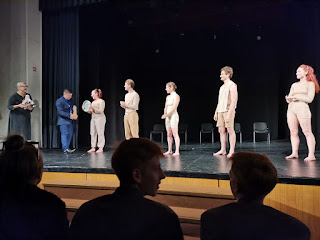Feminist Theory - a minefield?
Through my research in to gender roles in the theatre industry for my inquiry, I have really found it fascinating to read so much in the wider sphere of 'feminist theory'.
Perhaps due to the fact I went straight from doing my A Levels to what was essentially a vocational course and read mostly fiction, listen to 'The Guilty Feminist' podcast and saw a lot of theatre, my knowledge of 'feminism' as a concept stems mostly from real-life experience. General awareness and study are really two wildly different things! However, through study I am discovering so much depth within feminist theory that I'm finding so interesting.
We are so quick to call ourselves 'feminists', especially within our generation who have grown up with the waves pretty much behind us. There is an inherent privilege (in my opinion) to be fighting for pay equality as a movement- but also able to live in a Western society, with the ability to be independent and forge our own paths set up for us purely because of the struggle of previous generations. Our parents and grandparents have had such differing experiences and laws throughout their lives, so it's really been so changed just within recent history. In many nations things haven't improved as dramatically as they have in the UK. Quite honestly, it's a minefield when you start to delve in to the different 'factions' and sub groups that are present in feminist theory.
Take this section by writer R. Tong:
Liberal feminists cite women's oppression as rooted in social, political, and legal constraints. Radical libertarian feminists hold that the patriarchal system that oppresses women must be completely eliminated and that women should be free to exercise total sexual and reproductive freedom. Radical cultural feminists urge women to extricate themselves from the institution of compulsory heterosexuality. Marxist–socialist feminists claim it is impossible for anyone, especially women, to achieve true freedom in a class-based society. Multicultural feminists explain how the idea of ‘sameness’ could counterintuitively be used as an instrument of oppression rather than liberation. Postmodern feminists challenge Western dualistic thinking. Global feminists stress the universal interests of women worldwide. Ecofeminists focus on the connection among humans to the nonhuman world. Feminist theory has impacted virtually all structures, systems, and disciplines, challenging traditional ontological and epistemological assumptions about human nature as well as ‘maleness’ and ‘femaleness.’ Modern feminism, which began 200 years ago, has evolved in three waves. The first wave dealt with suffrage; the second centered on equal access; and the current wave is focusing on global equality.
All of the points of view are incredibly complex and all deserve further exploration. I suppose the idea I've been really taking from this research is, even within feminism as a concept- there are so many people trying to work out where they 'fit' in their feminism- and of course, how do they fit in the wider world? What is their view and what is their 'place'? The same could be said for the gender roles within the theatre industry- casting and producing work is a process of finding out which school of thought you belong to and crucially: who is your audience?
So much to explore in terms of themes during my critical reflection and analysis process which links to feminist theory! Better get my thinking cap on 🤓


Comments
Post a Comment